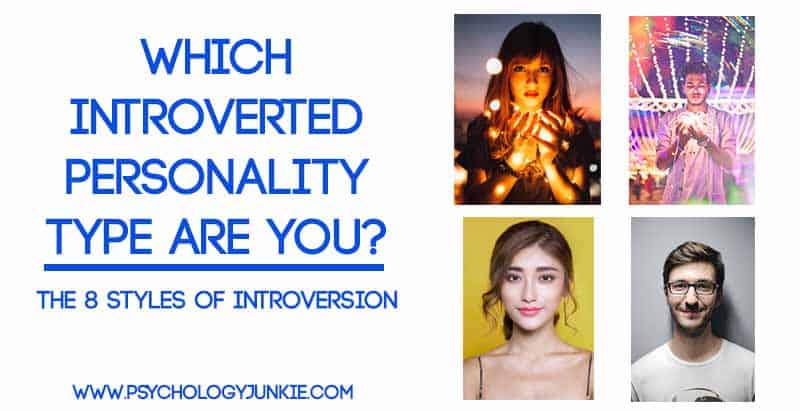Which Introverted Personality Type Are You? Discovering the 8 Styles of Introversion
When it comes to introversion and extroversion, no two people are alike. There are actually eight different kinds of introverts and eight different kinds of extroverts, and there are BIG differences between each one. Your brand of introversion is completely unique; even if you fall into one of these eight styles, you have a unique environmental background, set of beliefs, and set of preferences that make up who you are. But without further ado, let’s discover which type of introvert YOU are.
Not sure what your personality type is? Take our new personality questionnaire here. Or you can take the official MBTI® here.

Which Introverted Personality Type Are You?
The Introverted Sensor
Do you find yourself drawn to your favorite past memories and reflections? Do you easily spot changes and inconsistencies? Are you highly attuned to how your body feels and whether you’re tired, hungry, full, or sick? Do you find comfort in routine and structure? If so, then you’re probably an introverted sensor.
As an introverted sensor you probably feel like you move back and forth in time. You notice changes and inconsistencies that other people don’t. When someone doesn’t follow through on their word or they change their tune from one moment to the next, you notice this right away. You believe in loyalty, responsibility, honesty, and life experience. People can count on you to be consistent, true, and dependable. They trust your word because they know you won’t give it without meaning it.
When it comes to living out your daily life, you like to know what to expect, when to expect it, and how to prepare. You like the comfort of familiar routines and structures and you like tried-and-true recipes, techniques, tips, and ideas that have worked before. You trust proven facts and evidence and most people count on you to be down-to-earth, level-headed, and reasonable.
Like the introverted sensor Cary Grant, you’re classy, polite, modest, and you probably have a bit of dry, offbeat humor lurking just below the surface if people get to know you well enough.
“Ah, beware of snobbery; it is the unwelcome recognition of one’s own past failings.” – Cary Grant
Related: 10 Signs That You’re an Introverted Sensor
There are two different kinds of introverted sensors. Which one are you?
The Feeling Introverted Sensor (ISFJ)
Do you naturally understand how people are feeling and how to maintain morale and harmony? Are good manners and etiquette important to you? Do you have an internal radar that tells you when someone is angry, upset, hurt, or feeling left out? If so then you’re probably an ISFJ.
When you make decisions you think about the people involved and how they will be affected. Sure, logic and facts are important, but you place priority on making sure everyone’s personal needs are met and nobody is adversely affected. You want people to feel at ease and comfortable around you and you have a natural warmth and empathy. You’ll often find yourself preoccupied with the concerns and cares of others and you’re usually a generous, thoughtful friend.
Related: 5 Ways to Annoy an ISFJ
The Thinking Introverted Sensor (ISTJ)
Do you naturally see the logical cause and effect of actions and decisions you make? Do you aim to be objective in all of your decisions? Do you look at the pros and cons when you decide and seek the truth over tact? If so, then you’re probably an ISTJ.
When you make decisions you think about the facts, the function, and the truth. You try not to be swayed by personal feelings because that might mean you make a biased decision. You try to remain cool and logical and not let your emotions get the best of you. You try to keep a level head and use a lot of common sense in everything you do. You value logical input and while you try to consider the needs of others, honesty and logical prudence is what guides you.
Related: Getting to Know the ISTJ
The Introverted Intuitive
Do you find yourself looking for deeper meanings in the things you hear, see, and experience? Do symbols and metaphors stand out to you? Do you get sudden hunches or visions that seem to appear out of nowhere? If so, then it’s likely you’re an introverted intuitive.
As an introverted intuitive you focus more on the abstract and unknown than the concrete and proven. You are always asking yourself, “What else is going on here?”. You tend to read between the lines, and sometimes you just “know” something about the future and you’re not sure why. You may spend your days trying to figure out if there’s any logic behind your gut feelings and hunches, but more often than not they are uncannily accurate and hard to pin down. You can get so lost in your thoughts and meditations that you are prone to procrastination and feeling “out of touch” with the physical world around you.
When it comes to living out your daily life, you focus more on the future than the present. You want to determine how things will play out in 10,20, or 100 years. You can lose touch with the moment as you tinker with perspectives about the future. You find yourself constantly perspective-shifting and imagining things from various angles, stances in time, and points of view. You are extremely independent and are more focused on new, unproven, untraveled pathways than the tried-and-true methods or ways of doing things.
Related: 10 Signs That You Might Be an Introverted Intuitive
There are two different kinds of introverted intuitives. Which one are you?
The Feeling Introverted Intuitive (INFJ)
Along with your intuition that drives you, do you find yourself concerned with harmony and the emotional well-being of others? Is maintaining morale extremely important to you? Are you aware of social graces, manners, and the proper way to behave in social situations? If so, then it’s likely you’re an INFJ.
As an INFJ you support your intuition with Extraverted Feeling (Fe). Fe gives you an awareness of outer emotions, moods, and values. When you make a decision you try to “step in” to imagine how it would feel for everyone involved. You try to decide which choice will impact everyone in a positive way. You’re quick to pick up on what behavior would be acceptable or appropriate given the situation, and you know how to listen and make people feel understood.
Related: The Childhood Struggles of INFJs
The Thinking Introverted Intuitive (INTJ)
Along with your intuition, do you find yourself concerned with organizing your outer world logically? Do you like having a plan, delegating projects, and ensuring things are done in a timely, efficient manner? Do you talk out your decisions when you make them? If so, then you’re likely an INTJ.
As an INTJ you support your intuition with Extraverted Thinking (Te). Te gives you a desire to keep things in your outer world organized, productive, and efficient. You have to extravert (talk out) your decisions and you trust empirical knowledge and evidence. When you make a decision you “step out” to look at everything objectively and without personal bias. You are concerned with being fair, honest, and logical.
Related: The Childhood Struggles of INTJs
The Introverted Thinker
Do you find yourself constantly organizing your internal thoughts into categories, sub-categories, and frameworks? Do you want to understand the ins and outs of how everything works and is put together? Do you seek internal precision and logical truth? Are you extremely precise with your words and your analysis, always seeking to be as accurate as possible? Do you process your decisions internally and quietly? If so, then it’s likely you’re an introverted thinker.
As an introverted thinker, you build a vast, internal framework of how the world works and how everything is put together. You sort things into extremely precise categories and sub-categories, always looking for accuracy, logic, and internal order. On the outside, you might have a messy desk or a disorganized room, but inside everything is organized neatly and carefully labeled. You have a strong set of principles and truths that you count on, and in order for you to follow or believe anything, it has to line up with your individual set of principles. You’re not convinced by bureaucratic rules and structures, and you naturally question “rules” to see whether they line up with you sense of logic. You take a while to make a decision because you want to sift through all the information you’re given and look for the most precise, accurate answer. It’s more important to you that things make sense inside than that you follow a pre-established routine or structure or get things done “fast”.
You’re not afraid to think outside-the-box with your logic, and sometimes this rubs people the wrong way. If you try to process your decisions out loud it can be objectionable to people because some of your thinking flies in the face of “tradition” and supposed empirical truths that people have accepted for a long time but never really questioned.
Related: 10 Signs That You’re An Introverted Thinker
There are two different kinds of introverted thinkers. Which one are you?
The Sensing Introverted Thinker (ISTP)
Along with your thinking that drives you, are you also very focused on being practical, down-to-earth, and engaged in the outer world? Do you like to interact in a hands-on way with tools, objects, and nature? Are you able to quickly react to changes in your physical environment and adapt to the physical world with ease? If so, then it’s likely that you’re an ISTP.
As an ISTP, you want to find a practical application for all your logic. You want to get out into the world and use the truths you’ve learned as you interact directly with nature, with objects, and with concrete tangible items. You probably feel like you have a heightened awareness of the details around you and you know instantly when something shifts or changes or when there is any kind of a physical threat. You are down-to-earth, realistic, and focused on making the most of what “is”. You are very resourceful, easily taking in what’s around you and noticing how it can be used in an optimal way.
Related: Understanding ISTP Thinking
The Intuitive Introverted Thinker (INTP)
Along with your dominant thinking process, are you also very focused on theoretical possibilities and abstract connections? Do you find yourself constantly scanning for potential and alternatives in your outer world? Do you enjoy brainstorming and traveling down rabbit holes of thought and complex possibilities? If so, then it’s likely you’re an INTP.
As an INTP, you are more focused on the abstract than the concrete and tangible. You see things from many different angles and like to challenge tradition and “tried-and-true” techniques. You get a rush from finding a new concept or idea that has never been thought of before. You see connections between everything in the world and can find unusual correlations between things that other people don’t see. You hate routine, and you like to keep your options open in case new and exciting possibilities come to light.
Related: The Childhood Struggles of INTPs
The Introverted Feeler
Do you find yourself constantly refining and perfecting your internal value system? Do you make decisions that line up with your internal values, morals, and emotional needs? Do you get a gut feeling about something being right or wrong? Is being authentic and “real” of the utmost importance to you? If so, then it’s possible you’re an introverted feeling type.
As an introverted feeler you follow your conscience and everything else is secondary. Things have to feel “right” to you in order for you to follow them. You care less what society or culture says is right than where your own moral compass is leading you. You have an innate sense of good or bad, right or wrong, and sometimes these feelings of rightness come with a strong gut, physical sensation. You can feel sick or anxious anytime you’re faced with something that might violate your values.
As an introverted feeler, you pick up on other people’s feelings easily. You instantly imagine how it would feel to be in “someone else’s shoes”. You put yourself in other people’s positions to try to extract their experience. For this reason you are generally empathetic and compassionate. You are also individualistic. You believe in being true to yourself, and you dislike going along with society’s expectations. You dislike being labeled, told what you think, or being defined by generalized statements. You find that each person is unique, one-of-a-kind, and should not be pegged.
Related: 10 Signs That You’re An Introverted Feeler
There are two different types of introverted feelers. Which one are you?
The Sensing Introverted Feeler (ISFP)
Along with your dominant feeling process, you’re also very focused on the real, tangible world around you. You want to immerse your senses in the sights, sounds, tastes, and smells that you love. You’re adventurous and enjoy learning in a hands-on way. You can be very daring and enjoy living from moment to moment, taking advantage of opportunities as they arise.
ISFPs are usually very practical and down-to-earth; you are good at understanding the physical world and being realistic in your perceptions. You believe in making the most of what you currently have, and you enjoy helping people in a practical, hands-on way. Your genuine nature and your level-headed realism make you a beacon of strength for many individuals. People know they don’t have to be afraid to be real with you because you appreciate authenticity and because you’re not squeamish about the messy details of life.
Related: 10 Surprising Truths About ISFPs
The Intuitive Introverted Feeler (INFP)
Along with your dominant feeling process, you’re also very focused on the world of theoretical possibilities and abstract connections. You see potential everywhere and you are very imaginative and boundless in your thinking. You tend to think more about what “could be” than what currently is.
INFPs are usually very conceptual in their thinking; you quickly see connections between seemingly unrelated events. You like to be creative, and often enjoy writing and daydreaming and coming up with unusual, innovative ideas and plans. You hope to make your dreams a reality, but you also like to keep your options open as you seek out alternatives and new connecting possibilities. People see you as imaginative, open-minded, sincere, and idealistic.
Related: 10 Things You Should Never Say to an INFP
That Wraps It Up!
Do you connect with one of these styles of introversion? Do you have any thoughts to add? Let me know in the comments!
Find out more about your personality type in our eBook, Discovering You: Unlocking the Power of Personality Type.




















2 Comments